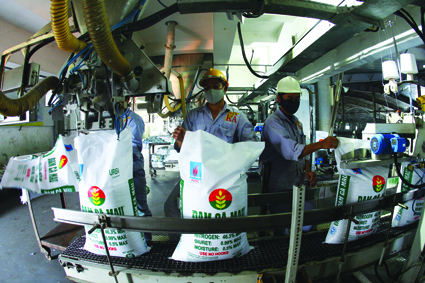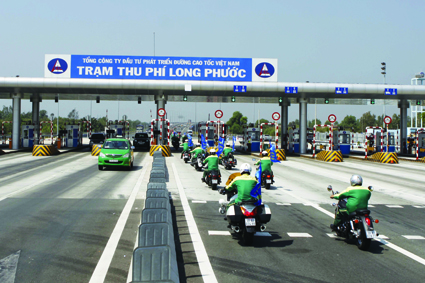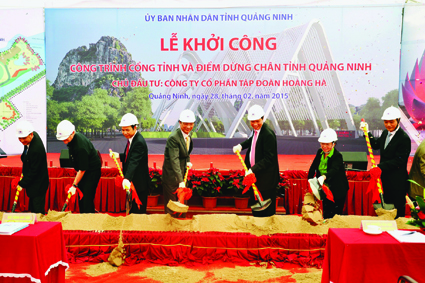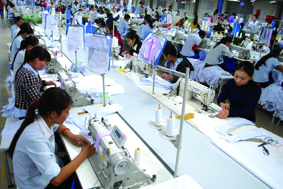* Lift of quarantine for export farm produce and seafood proposed
Quarantine of export farm and seafood products remains to be required by Vietnam’s competent agencies although many importers no longer perform such quarantine procedures.
This was heard at a conference recently held by the Ministry of Industry and Trade (MoIT) to discuss solutions to remove difficulties for and boost exports of farm and seafood products.
Minister of Agriculture and Rural Agriculture Cao Duc Phat said exports were vital to the agricultural sector as the country’s agricultural production surpassed domestic demand. In addition to market, exchange rate, trade promotion and product quality issues, administrative procedures and inconsistent imposition of tax, especially VAT, on exports remained barriers for export farm products.
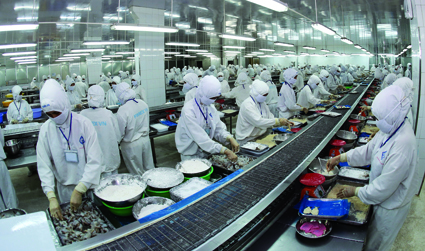 |
| Export frozen shrimp processing line at Sao Ta Food Joint-Stock Company (Soc Trang province) __Photo: Huy Hung/VNA |
MoIT Deputy Minister Tran Tuan Anh said in the coming time, his ministry would work with the Ministry of Agriculture and Rural Development (MARD) in implementing Government Resolution No. 19 to facilitate export procedures to increase enterprises’ competitiveness and review the list of export products.
In the meantime, MARD pledged to cut half of export procedures within the ministry’s competence in 2015 and propose the Finance Ministry to remove the five-percent VAT on rice sold at home.-
* State enterprises to pull out from real estate investment
The Ministry of Finance has proposed that all state-owned enterprises divest from their real estate investment projects.
Under the proposal which was made in line with Government Resolution No. 94/NQ-CP dated September 27 and Decree No. 71/2013/ND-CP, state capital owners must be responsible for transferring projects and capital mainly through auctions.
The transfer under agreements can only be made after unsuccessful auctions (no bidder or only one bidder) or in specifically prescribed cases. The reserve price for open auctions will be set based on the results of licensed valuation institutions but must not be lower than the book value of the investment amount.
For enterprises allowed to change land use purpose to implement real estate business projects under Prime Minister Decisions No. 09/2007/QD-TTg and No. 86/2010/QD-TTg, the projects will, depending on the re-arrangement of houses and land and the pace of the implementation, be transferred to other investors if these projects are eligible for transfer or the capital amount invested by enterprises in the projects will be transferred and the projects will be returned to the State for transfer to other investors.-
* Sale of SOE shares in lots to be regulated
Deputy Prime Minister and Steering Committee for Enterprise Renewal and Development Head Vu Van Ninh has assigned the Finance Ministry to report to the Prime Minister on selling shares in lots this month, ensuring publicity, transparency and interests of workers in equitized state-owned enterprises (SOEs).
The Deputy PM requested the state capital value for sale of shares in lots must be determined by professional valuation organizations and with various methods for optimal selection. The sale of shares in lots, mainly through open auctions, must conform to legal regulations.
According to the Finance Ministry’s draft regulations on sale of shares in lots, investors involving in auctions must provide technical assistance, expand markets for production and business fields of equitized SOEs and increase SOEs’ competitiveness. The number of shares bought in lots must not be transferred within the first five years.
Organizations and individuals can involve in the company’s administration after buying all shares or more than 50% of shares on sale.
The Deputy PM also requested the Finance Ministry to regulate the maximum and minimum levels of shares sold in lots to avoid unhealthy competition among investors and focus on the change of enterprise’ administration, and further classify state enterprises to allow investors to sell or transfer shares of enterprises the State no longer holds shares after auctions.-
* Increase of financial capacity for commercial banks proposed
The State Bank of Vietnam (SBV) has emphasized the necessity to enhance the financial capacity of state commercial banks by increasing their charter capital to boost their growth, competitiveness and the capacity to cope with risks and ensure operation safety, noting that the restructure of such banks is on the right track.
If all factors are taken in account, some banks fail to reach the required capital adequacy ratio as the State has not allocated sufficient charter capital as approved and their own capital is lower than its asset scale.
However, budget capital allocation is difficult and the reduction of the state ownership in those banks after equitization remains inappropriate given the State’s dominant role to implement monetary policies and stabilize the market.
The SBV has proposed the Government to allow state commercial banks to increase their charter capital by retaining their profits for 3-5 years instead of remitting to the state budget and issuing shares to strategic investors and existing shareholders.
The central bank asked the Government to propose the National Assembly to amend Resolution No.78/2014/QH13 toward allowing use of state dividends to increase charter capital of state commercial banks so as to ensure the state ownership of at least 65% in those banks.-
* Call for strict control of property brokers
The management of the operation of property trading floors and brokers must be tightened to prevent any speculation and boost the transparency of the currently upbeat realty market.
According to the Ministry of Construction, the development of property trading floors in recent years failed to meet market expectations and the percentage of property transactions conducted through trading floors was estimated at a modest rate of 15 percent, affecting transparency and leaving buyers hungry for information about housing projects.
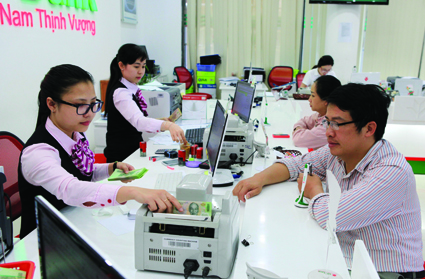 |
| Customers conduct transactions at VPBank Ho Chi Minh City branch __Photo: Tran Viet/VNA |
Recently, the Ministry of Construction asked to tighten checks on property developers and trading floors to ensure that they comply with regulations, especially in Hanoi and Ho Chi Minh City.
Experts said it is crucial to bring the property trading floor system under a strict management to boost the transparency of the real estate market.
From the beginning of this year, the market has witnessed a boom in the number of property start-ups, with realty consultant companies and many property firms planning to hire thousands of brokers this year.
Nguyen Manh Ha, Director of the Department of Housing and Real Estate Market Management, previously said that in the absence of comprehensive standards for brokers and trading floors, the existing laws failed to cover all property brokerage operations.
Experts remarked that management policies, together with policies to enhance the quality of real estate brokers, are needed to prevent unhealthy competition among property brokering firms.
The existing regulation that property transactions must be conducted through trading floors has proved inefficient and the 2014 Law on Real Estate Business, which will come into effect on July 1, removes the compulsion of this regulation.
Many experts said that a new regulation will allow home buyers to have more options and enhance transactions through trading floors, which might help eliminate trading floors that are not efficient, and improve the quality of realty brokering.
The Ministry of Construction has drafted a circular regulating the foundation of property trading floors and certification of property brokers. The draft has been released for receiving comments.-
